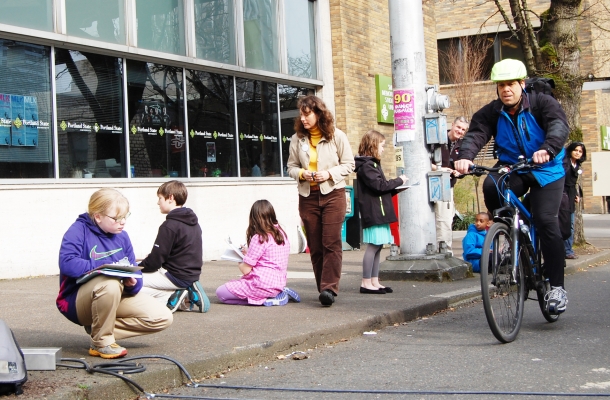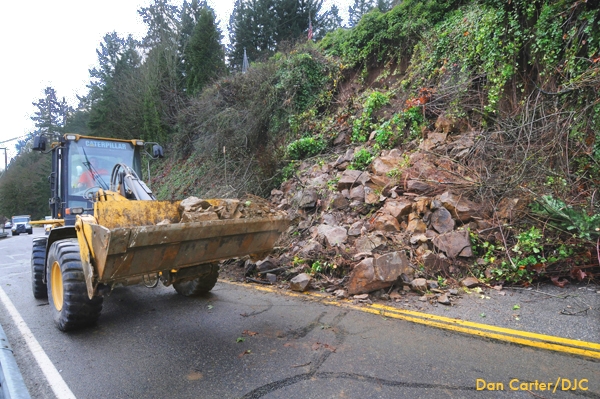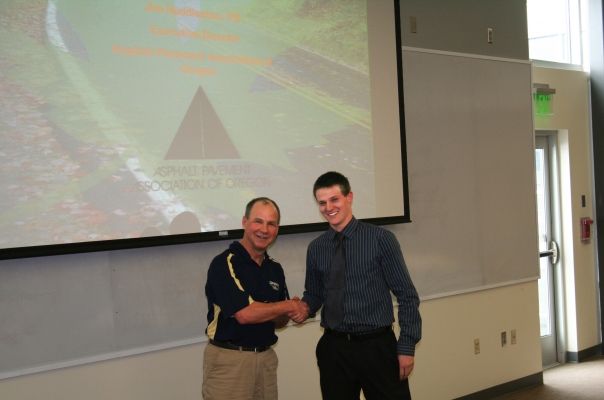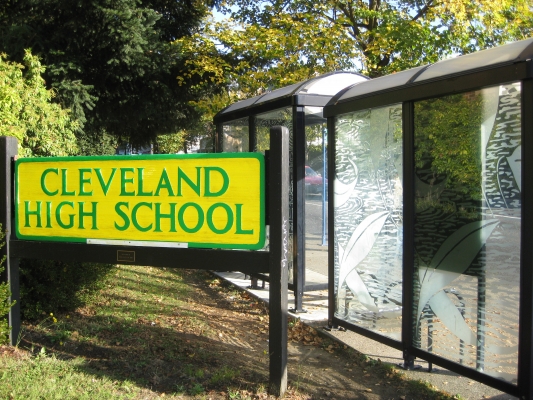OTREC turned its education efforts on a decidedly younger crowd March 13: sixth graders. A class from Rochester, N.Y., visited Portland on a trip geared toward improving bicycling in their own community.
The students, from Genesee Community Charter School, visited the OTREC offices to learn about active transportation research methods. They took part in group exercises designed to get them thinking about the planning and engineering challenges of transportation systems set up to serve multiple transportation modes.
The highlight of the day came when the students took to Portland’s streets — OTREC’s living laboratory — to conduct research of their own. Armed with bicycle-counter tubes and infrared detectors, students counted cyclists and pedestrians passing on the Broadway cycle track on Portland State University’s campus.
Other students verified the technology with manual counters.
Students moved on to their next stop on a four-day tour of Portland with a better sense of what kind of data researchers collect and how they can use those data to inform policy. Given their experience — the students already have influenced their city on policy ranging from Erie Canal re-watering to an urban art corridor to skate parks — they stand a good chance of using Portland’s lessons to build a bike-friendly Rochester.
The Oregon Department of Transportation, like DOTs in most other states, has an ongoing struggle to maintain public highways against earth movements such as erosion, earthquakes and landslides. An earthquake or landslide can close down a road for days, while highway workers fight to keep supply lines open and repair the damage.
In Oregon, particularly along the coastal roads, these natural processes are a constant threat to transportation infrastructure. The damage caused by gradual erosion is typically not detectable until there is a landslide or other disaster, costing the state considerable time and money to repair. New technology has the potential to change this. Many landslides, in fact, show some form of movement prior to catastrophic failure. A team of researchers, led by Michael J. Olsen of Oregon State University and sponsored by a research grant from OTREC, set out to improve upon the methods that ODOT uses to detect and prevent structural threats.
Olsen details his findings in an OTREC final report. Click here for more on the project, or download the final report.
The research centers on a three-dimensional remote sensing technology known as...
Read moreThe Oregon Institute of Technology welcomed the head of the Asphalt Pavement Association of Oregon for the Oregon Tech NITC Visiting Scholar Seminar. Jim Huddleston, the association’s executive director, spoke Feb. 21 at Oregon Tech’s Klamath Falls campus.
The seminar drew 45 people, including students, faculty and professionals from local consulting engineering firms.
Huddleston, who holds bachelor’s and master’s degrees in civil engineering from Oregon State University, has more than 20 years’ experience in pavement design, construction and analysis. He is one of the nation’s leading experts on asphalt roadways, including innovative and sustainable applications such as recycled, warm-mix and porous pavements.
On his visit, Huddleston also congratulated Oregon Tech senior Zachary Hudspeth on winning an Asphalt Pavement Association of Oregon scholarship in December. Hudspeth is the president of Oregon Tech’s Institute of Transportation Engineers student chapter.
The seminar and student group are supported by OTREC’s National Institute for Transportation and Communities program.
Students at Portland’s Cleveland High School learned on Tuesday that their school sits at the heart of pioneering transportation research. The school is at the corner of Southeast 26th Avenue and Powell Boulevard, a corridor in which a variety of advanced traffic management technologies have been installed.
Adam Moore, a graduate student in transportation engineering at Portland State University, and Jon Makler, OTREC’s program manager for education and technology transfer, were guest teaching some algebra classes at Cleveland High as part of National Engineering Month.
In Oregon every February, the Business Education Compact helps match thousands of professional engineers who volunteer to teach in classrooms from elementary through high school. The goal is to raise student awareness of the opportunities and rewards of working in science, technology, engineering and math (STEM) fields.
This is the third year of volunteering for Makler, who developed a lesson plan that describes the many ways that transportation relies on STEM skills, including engineering. After watching helmet cam footage of biking in downtown Portland, students used basic algebra to learn about how traffic signals are timed to make streets safe and efficient for people in cars, on bike or on foot.
But Moore stole the show as he explained how various devices at the intersection of Powell and 26th help manage traffic. Students were...
Read moreContinuing a tradition started last year, Portland State University's Students in Transportation Engineering and Planning hosted a gathering called "TRB Aftershock" to showcase student research presented at the recent Transportation Research Board annual meeting in Washington, D.C.
The event also allowed students to network and describe their research with practitioners in an informal setting.
More on the event is at the STEP blog here.
Tessa Walker, a Portland State University master's student in urban planning, has launched a national survey on skateboarding for transportation for her thesis resesarch. Walker sees skateboarding as a mostly unexplored corner of active transportation, with little information available to guide urban planners.
The study is open to people 18 and older in the U.S. and Canada who have skated as a way to get around within the last five years. Responses will be kept confidential and used for research purposes only.
To take the study or learn more, visit:
http://skatestudypdx.wordpress.com/
The Initiative for Bicycle and Pedestrian Innovation is pleased to announce three scholarship opportunities made possible through the generous donations of Rex Burkholder and Lydia Rich; Alta Planning + Design, and DKS.
- The Rex Burkholder and Lydia Rich Scholarship supports a graduate student who intends to pursue a career related to bicycle and pedestrian transportation.
- The Alta Planning + Design Scholarship supports a graduate student who is highly motivated to focus their studies on walking and cycling as mainstream forms of transportation. This is both a scholarship and a paid internship.
- The DKS Scholarship will support a student seeking to better understand how communities integrate bicycling and walking through the engineering, design and planning processes.
For more information and applications, please visit:
http://www.pdx.edu/ibpi/ibpi-scholarships
For questions, please contact Hau Hagedorn at hagedorn@pdx.edu
Deadline:Thursday, February 21, 2013
On Jan. 16, the second-to-last day of the Transportation Research Board's annual meeting in Washington, D.C., OTREC research stood out during the poster presentations. That was especially true for student researchers, who presented the majority of the OTREC research.
- Some highlights: Patrick Singleton presented a review of how metropolitan planning organizations represent walking in their transportation models. His research, with Portland State University's Kelly Clifton, determined that 30 of the 48 largest MPOs include non-motorized travel in their regional models, with 14 also distinguishing between walking and bicycling.
- Another group working with Clifton offered much-anticipated research on consumer spending and travel choices. Kristina Currans, Christopher Muhs, Chloe Ritter, Sara Morrissey and Collin Roughton presented findings that customers who arrive by modes other than the automobile are competitive consumers, spending similar amounts or more, on average, than their counterparts using automobiles. They are also more frequent patrons on average, presenting a unique marketing opportunity for these businesses.
- Joseph Broach worked with OTREC Director Jennifer Dill to model children's independent travel to parks and schools and explore factors that may have led to a drop in active trips. They found that peers who bike to school encouraged riding, while helmet use discouraged cycling among 11- to 16-year-olds. For trips to parks, girls...
A total of 133 researchers from OTREC campuses will have their work featured at the Transportation Research Board national conference the week of Jan. 13 in Washington, D.C. Seventy-two separate sessions will feature research from Portland State University, the University of Oregon, Oregon State University and the University of Utah.
The weeklong conference is the event of the year for transportation researchers across the country and an important opportunity for students and faculty to share research results, learn best practices and network.
As OTREC prides itself on developing the next generation of the transportation workforce, students are well represented at the conference. Nearly 50 students will have their research presented at lectern or poster sessions and many of those students are the lead authors of papers accepted for the conference.
Portland State University alone is sending 30 graduate and undergraduate students to the conference. Katherine Bell, a Portland state graduate student, will present research at a freight planning and logistics session on Monday. Bell worked with Miguel Figliozzi of Portland State’s civil and environmental engineering department on an OTREC research project that could mark a sea change in how freight data is collected and used.
Oregon is one of a few states to collect a tax on heavy trucks based on their weight and miles driven. In 2010, The Oregon Department of Transportation started a pilot project to...
Read moreOTREC announces the opportunity to apply for awards to support small faculty development research endeavors with priority given to untenured, tenure-track faculty and faculty who have not received an OTREC grant in the past. The purpose of these awards is to assist researchers interested in transportation but have not had an opportunity to undertake a small project that supports innovations in sustainable transportation through advanced technology, integration of land use and transportation, and healthy communities. A total of $60,000 is available to be awarded; with no individual award larger than $10,000. All grants require 1:1 match. Proposals are due January 31, 2013. Complete details for the Small Starts grants can be found in RFP and Budget Form. Contact Hau Hagedorn (hagedorn@otrec.us) with questions.
Eligibility: Faculty members and research faculty eligible to serve as Principal Investigators (PIs) at Portland State University, Oregon State University...
Read more




